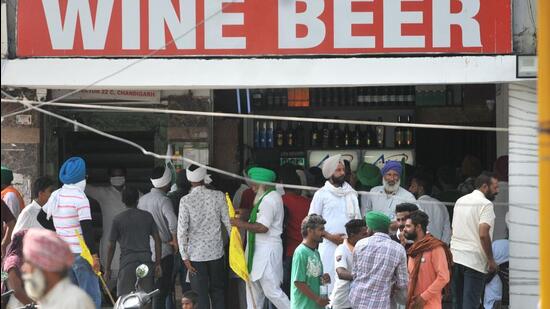Excise policy: Liquor set to get cheaper in Punjab from July
In the excise policy announced by the Punjab government, revenue generation has been pegged at ₹9,647.85 crore, an increase of 40% from the last financial year
In the excise policy announced by the Punjab government for the current financial year on Wednesday, the revenue generation has been pegged at ₹9,647.85 crore, an increase of 40% from the last financial year.

Delayed due to the new government formation, the policy will be applicable for nine months, from July 2022 to March 2023. The policy was cleared in the state cabinet meeting chaired by chief minister Bhagwant Mann on Wednesday.
Sources in the excise and taxation department said liquor prices have been reduced by 40-50% in the new policy, while no quota has been fixed for the sale of Indian made foreign liquor (IMFL) and beer. It means vend owners can sell as much liquor as they can.
The reduction in prices, which will bring them on a par with that in neighboring states, will help in curbing smuggling, said the sources cited above. Historically, liquor has been cheaper in Chandigarh and Haryana.
Meanwhile, quota has been fixed for Punjab made liquor (PML). Each group has to pick up its 150 cases every day where the sale of IMFL is more. In the groups where the IMFL sale is proportionately less, the daily quota of PML is fixed at 250 cases. Generally, each case has 12 liquor bottles in a packing of 750 ml.
Number of clusters reduced
The policy has reduced the number of groups or clusters of liquor vends from about 750 in the last financial year to 177, with the idea to increase control over liquor trade and tap optimum revenue potential in the sector.
The government has fixed the total number of vends at 6,378. The base rate of each group has been fixed at ₹30 crore, with the contractor making the highest bid set to get the allotment.
The state government will earn excise duty on all kinds of liquor, except PML, to be charged at the rate of 1% of the wholesale price. On the same pattern, the assessed fee of IMFL shall also be charged at 1% of the wholesale price.
On assuming power in March, the Aam Aadmi Party (AAP) had extended the 2021-2022 excise policy for three months with a nominal increase in revenue generation.
Measures to check smuggling
A spokesperson of the chief minister’s office said the new policy envisages curbing liquor smuggling from neighboring states through extensive enforcement and by incorporating new technological measures. To increase surveillance, the cabinet also gave the nod to allot two special battalions of police to the state excise department in addition to the existing force. “This will help in keeping a better check over the supply of illicit liquor into Punjab from the neighbouring states and vigil over the excise duty pilferage,” said a government spokesperson.
The spokesperson said that the new excise policy aims to break the nexus of mafia involved in liquor trade. “The manufacturer, wholesaler and the retailer, will also be separated,” he said.
To encourage investment and increase the employment in the state, provisions for new distillery and brewery licences have been made in the policy. The government has also introduced a new license for the production of malt spirit in the state, to encourage crop diversification and support the farmers.
New policy will lead to total plunder: BJP
Meanwhile, the Bharatiya Janata Party (BJP) alleged that the new excise policy approved by the Punjab cabinet will lead to a “total plunder and loot” of the state revenue.
Calling it the Delhi model of excise policy, BJP leader Manjinder Sirsa accused the Aam Aadmi Party (AAP) government in Punjab of creating a “system of monopoly to benefit two particular firms”. He alleged that according to certain terms mentioned in the policy for liquor licences, “most businessmen from Punjab will not be able to qualify to even apply”.
Sirsa, who was addressing a press conference here, claimed that he had lodged a formal complaint with the Central Bureau of Investigation and Enforcement Directorate to check into the alleged irregularities in the formulation of the policy. Punjab BJP general secretary Subhash Sharma and former minister Gurpreet Kangar were also present at the media briefing.





